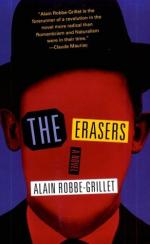|
This section contains 283 words (approx. 1 page at 300 words per page) |

|
Robbe-Grillet considered himself fortunate not to have been formally schooled in literary conventions, as his ignorance of them freed him to experiment with new forms for the novel. At the time he was beginning to write, the French literary scene was dominated by such writers as Sartre, Malraux, and Camus, and the concept of "litterature engagee," literature which is committed to some political, social or ideological task. Although writers like Joyce, Kafka, Faulkner, and Beckett were challenging the traditional form of the novel, the prevailing view was still that it was primarily a representational art, the vehicle for some message or truth about the world.
Robbe-Grillet was not alone in his experimentation. A number of his contemporaries — among them, Nathalie Sarraute, Claude Simon, Michel Butor — were creating texts which exhibited a similarity of form, and, in the judgment of some critics, an increasingly unreadable...
|
This section contains 283 words (approx. 1 page at 300 words per page) |

|




